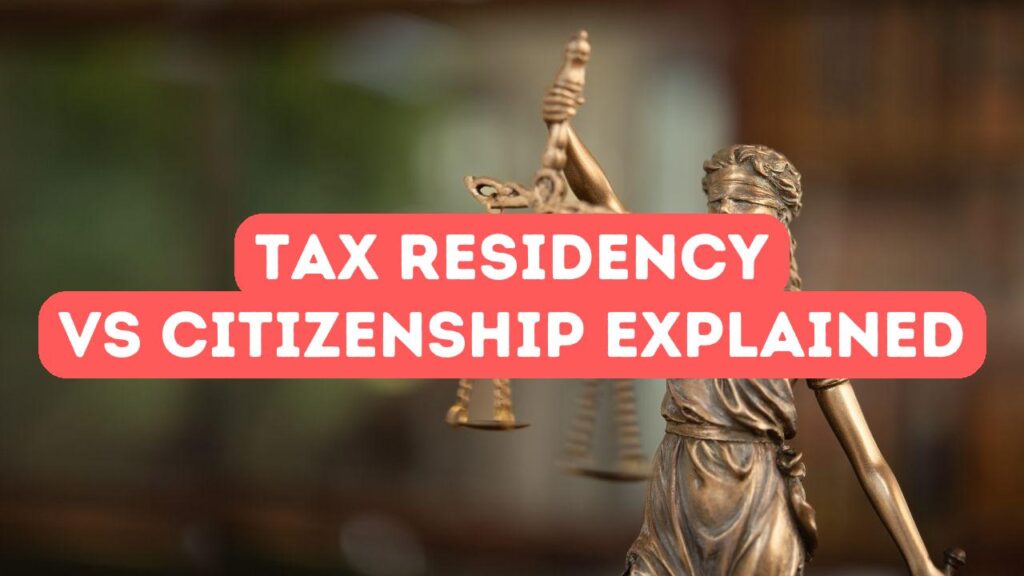Navigating the world of global investments requires a firm grasp of tax residency and citizenship. Investors face unique challenges when distinguishing these two concepts, both of which have significant tax implications. Tax residency determines where you pay taxes, while citizenship often dictates your legal obligations and rights. This distinction is crucial for investors seeking to maximize returns and minimize liabilities. A recent investor guide revealed that understanding tax residency versus citizenship can transform your global investment strategy. For instance, being a tax resident in one country may offer different benefits or impose various obligations not tied to citizenship status. As the international financial landscape evolves, knowing how tax residency impacts your finances can be the difference between profit and loss. Engaging with the right resources can offer clarity and precision in decision-making, ultimately empowering you to make informed choices in your investment journey. Why risk confusion when knowledge can pave the path to success?
Understanding the Key Differences Between Tax Residency and Citizenship
Understanding the distinction between tax residency and citizenship is paramount for investors looking to navigate global investments effectively. Tax residency primarily dictates where an investor pays taxes, whereas citizenship often involves legal rights and duties in one’s home country. This differentiation can lead to varied tax implications for investors across borders. For example, tax residency in one country might mean enjoying certain tax benefits, which aren’t necessarily linked to citizenship status. The investor guide emphasizes that comprehending these nuances can be a game-changer, helping investors maximize returns while mitigating potential liabilities. As tax laws evolve, failing to grasp these concepts could leave investors vulnerable. Making informed decisions requires a solid understanding of how tax residency and citizenship impact your financial strategy. Embrace the opportunity to untangle this complexity and let knowledge guide your investment choices, ensuring better control over your global assets and outcomes.
Understanding these key differences between tax residency and citizenship is crucial for investors engaged in global investments. Tax residency can shift based on where you reside, impacting tax obligations significantly. Conversely, citizenship generally remains unchanged, often tied to the country of birth, including legal rights and responsibilities. The investor guide highlights the necessity of knowing how these differences influence tax implications. For instance, a tax residency in a low-tax jurisdiction could offer substantial financial advantages, while citizenship might not provide the same benefits. Consequently, global investments demand clarity in these distinctions to harness potential tax efficiencies and strategize effectively. Awareness of these elements helps investors navigate the complexities of international finance, transforming challenges into opportunities. The right guidance can simplify these complexities, enabling informed decisions that align with an investor’s goals and risk appetite. This insight is akin to a compass in the ever-evolving landscape of taxation and global investing, directing you towards better outcomes.
Understanding the nuances between tax residency and citizenship can significantly affect financial outcomes for global investments. Tax residency shifts with residence, impacting an investor’s tax obligations and potentially offering different advantages than citizenship. This investor guide stresses how tax implications arise when one is a tax resident in a country with favorable tax laws, versus citizenship that might not shift tax benefits similarly. Navigating these distinctions is vital for crafting strategies tailored to unique financial goals. For example, tax residency might allow leveraging special tax treaties, while citizenship remains constant, affecting other legal matters. The smart investor knows that clarity here means leveraging opportunities and avoiding pitfalls. With the tide of global finance ever-shifting, understanding these key differences positions you to seize the best from your investments, much like a sailor harnessing the wind, steering through the intricacies of international tax landscapes.
Impact of Tax Residency on Global Investment Strategies
Tax residency is the compass that steers your global investment strategies. Its impact is profound, influencing not just where taxes are paid but how much. As investors dive into global investments, recognizing the tax implications of their residency status becomes crucial. Imagine residing in a country where the tax rates are favorable compared to your home country—that’s a game-changing advantage. An investor guide often highlights these nuances between tax residency and citizenship, shedding light on potential savings and obligations. Without proper understanding, you might find yourself caught in tax traps or missing out on beneficial treaties. The choice of tax residency can pivot the scales of your investments, turning possible pitfalls into promising opportunities. Therefore, every decision should be wrapped in a clear understanding of tax implications and the diverse landscapes they present worldwide.
Understanding the impact of tax residency on global investment strategies is like holding the key to a treasure chest of opportunities. Tax residency shapes how and where taxes are paid, directly affecting financial outcomes. An investor guide can uncover hidden benefits tied to specific jurisdictions, revealing a path through the labyrinth of tax implications. For instance, being a tax resident in a jurisdiction offering favorable tax treaties can amplify returns, making citizenship nuances subordinate. However, blur the lines, and you might stumble upon unexpected burdens, much like the unexpected twist in an otherwise straightforward journey. The interplay between tax residency and citizenship is intricate; missing a single detail can alter the course of global investments. Recognizing this, savvy investors prioritize tax residency strategies to safeguard and grow their financial portfolios. Investing time to master this connection is a necessary endeavor in the pursuit of maximizing gains and minimizing losses worldwide.
Tax residency, when intertwined with global investments, acts as a double-edged sword. On one side, it offers lucrative tax implications, while on the other, it can impose unforeseen obligations. This dual nature demands an investor guide that is not only detailed but also insightful. For investors, specific jurisdictions present unique opportunities where citizenship might take a backseat to tax residency advantages. Consider the scenario of investing in a country with favorable tax rates; it’s like having a golden ticket to enhanced profits. Conversely, misjudging your tax residency can lead you into unnecessary tax quagmires, akin to stepping on thin ice. Therefore, understanding the matrix of tax residency and citizenship is paramount. Investors keen on sharpening their financial acumen must navigate these waters with precision, ensuring their global investments yield the best possible outcomes. Knowledge here isn’t just power—it’s the anchor that steadies the ship in turbulent waters.
Navigating Tax Implications: A Guide for International Investors
When it comes to navigating tax implications, a clear understanding of tax residency versus citizenship is essential for international investors. Tax residency often dictates the level and location of an investor’s tax obligations, while citizenship may not carry the same weight regarding financial liabilities. For instance, in many cases, being a tax resident can trigger obligations in a different country from one’s citizenship, affecting global investments. The stakes are high—mistakes could mean costly tax penalties. Utilizing an investor guide can illuminate the path, offering insights into how these concepts interact and impact your finances. As financial landscapes shift, investors need strategies to address tax implications, maximizing returns. Not knowing the discrepancies could leave money on the table. Therefore, engaging with tools and resources that shed light on tax residency is your shield against potential pitfalls, empowering your financial decision-making.
Understanding tax residency and citizenship is vital for international investors. The tax implications of these statuses can make or break your global investments. An investor guide becomes indispensable as it unveils how these elements integrate into your financial strategy. Imagine tax residency as a magnet pulling you into specific obligations, while citizenship often stands apart in this context. Yet, together, they draw the map of your fiscal responsibilities. Missing the signs could lead to unexpected penalties. Keep your eye on how tax residency influences your investments’ success. It’s not just about following rules but mastering them. By doing so, you not only navigate but also harness tax implications to your advantage. This journey, armed with the right investor guide, transforms potential risks into strategic opportunities. Don’t let confusion cloud your vision—clarity and preparation are your allies in securing prosperous global investments.
Dive into the intricacies of tax residency and citizenship with a comprehensive investor guide tailored for global investments. Each step you take toward understanding these tax implications can safeguard and elevate your financial ventures. Imagine a scenario where tax residency changes could derail your investment plans due to unforeseen liabilities. Knowledge becomes your compass, guiding you through the maze of international finance. Picture citizenship as your anchor, binding you with certain global investments and rights, while tax residency shifts influence your economic strategies with each wave. Here, proactive planning is more than a necessity—it’s your lifeline. By meticulously dissecting how tax residency legislation impacts investments, you position yourself to craft adaptive strategies. Don’t allow the complexity of tax implications to weigh you down; instead, leverage them as stepping stones to financial success. Engage fully with expert resources and transform apprehension into informed action, securing your foothold in the global market.







